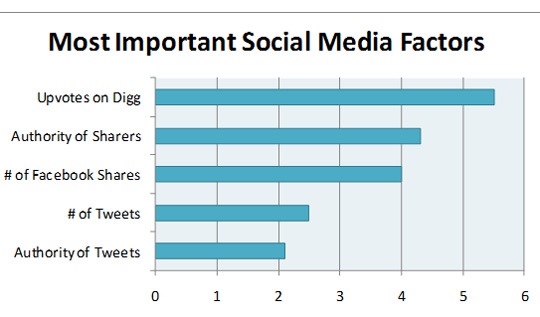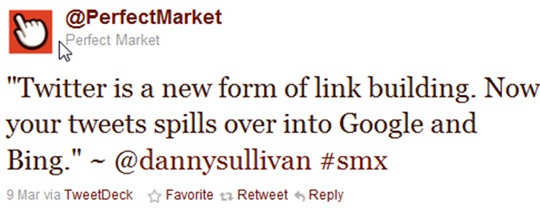Twitter is incredible for so many reasons. For some, Twitter is a platform for promotion. For others, it’s a market research tool. The great thing about Twitter is you can use it however you want.
However, what many businesses don’t address is the impact Twitter can have on search results. Learning how to share and format your content on Twitter can directly impact your organic search results.
In this article I’ll review how Twitter works to impact search results.
Twitter and Search’s Unexpected Marriage
According to a study on social media growth, the goal of social media is to identify and attract new customers. Many marketers don’t plan on using social channels like Twitter to influence their search rankings, it just happens to be an added benefit.
Many simply plan to get a bit more traffic, but if we learn how things like anchor text and URL shortened links play in to search results, we may be able to optimize our ability to draw users from both social and search.
According to study done by SEOMoz, social is shockingly well correlated to search engine results. More than 80% of people surveyed believe that in the future social signals will influence rankings at both a domain level and page level.
It only makes sense for search engines to incorporate a human element in their results. Traditional SEO tactics garnered spammy and low quality search results. From a search perspective ranking domains and pages, based on what people are talking about, makes results much more relevant and timely.
Your Authority Matters
It seems who you are on Twitter plays into how much search “juice” you get. If you have 100,000 followers actively retweeting and responding to your tweets, you are looked at as an “expert,” in search algorithms. If you are familiar with how domain authority impacts search results, it seems to be the same process, in which your Twitter power impacts authority.
The chart below illustrates the same study done by SEOMoz. The study surveyed 132 SEO experts, as they ranked their most important to least important social media factors 1-10. According to the survey “Authority of Tweets” and “# of Tweets,” were the most influential social media factors that played in these SEO expert’s search results.

Caption: SEO Expert survey: On a scale from 1-10, how important are social media factors in search rankings? 1 being most important and 10 being least.
“We do look at the social authority of a user. We look at how many people you follow, how many follow you, and this can add a little weight to a listing in regular search results. It carries much more weight in Bing Social Search, where tweets from more authoritative people will flow to the top when best match relevancy is used.” –Bing via Search Engine Land.
Building Links On Twitter
A topic that many SEO experts are “up in the air” on is Twitter’s power to replicate consistently replicate link building’s benefits. Although Twitter links are “nofollowed,” the importance of the link depends strictly on the number of tweets and retweets that are aggregated on websites. A good deal of websites put their Twitter feeds on to their webpage, which means that every time your content is retweeted by them it builds links. If this conclusion is valid, one could assume that link authority can be transferred to retweeted links. For example; The Retweetist is just one of many sites that aggregate Retweets and follow links.

Caption: Blue highlight illustrates a DoFollowed link
Real Results
There have been numerous case studies where a tweeted link that goes “viral” gets redirected around Twitter, and the host site ends up ranking for anchor text keywords within the article.
Take for instance Marcus Taylor’s case study on SEOptimise. Marcus set up a brand new domain, “yogamatcompare.com” and began ranking for search terms within hours of sharing content on social channels. One of the most surprising things within the study is that he did no on-site SEO at all to his site. A summary of Marcus’ social experiment was after:
- He received 40 Facebook Likes for his domain – Google indexes “Yogamatcompare.com.”
- He received 110 Facebook Likes and 1 Tweet – He began ranking for the term “yoga mat compare.”
- After 117 Facebook Likes and 4 retweets- He began ranking on the first page for the term “yoga mat compare.”
- After 118 Facebook Likes, 4 retweets and 1 link shared on Yoga related sites- he began ranking for “luxury yoga mats.”
Marcus Taylor concluded after his study that, “you can see a progressive increase in not only rankings but the variety of keywords ranking…if I were to carry on acquiring more and more likes and tweets I could potentially attain competitive rankings for these keywords.”
So it seems that collective tweets that are retweeted, pass on link juice by being disseminated across the web on website Twitter feeds. Marcus Taylor questions, “How does this affect SEO? Right this moment I think it’s safe to assume that acquiring likes, tweets and other social signals is a fairly good strategy for not only improving indexation but also rankings.”
Ultimately, establishing Twitter authority improves long term organic search relevance for your site when you share content. Make sure your content’s keywords text is optimized because it seems this is taken to consideration when ranking on search, giving your website traditional SEO benefit from social behaviors.

Caption: Perfect Market’s tweet, recapping the Search Marketing Expo
What This Means For You
Establishing thought leadership on Twitter is important. Easier said than done right? We know that Twitter users are portals for blog promotions; a tweeted link gets power from author authority and retweets. Think of your Twitter account as a pyramid. The higher you are able to drop a link from, the more of the pyramid you will be able to capture; and ultimately the more retweets from authoritative twitter-ers.
To find author authority, Topsy.com gives a list of “experts” when they index search. The goal is to find a niche within Twitter that gets your content to fall majestically through Twitter streams. As Google modifies it’s algorithm to incorporate end user relevance, through a hybrid crowd sourced social indexing model; the SEO waters will become cloudier. Social media, especially Twitter, is a powerful tool for marketers to rank for search terms without spending years on link building campaigns. SEO is no longer a systematic labor intensive process of seeking out partnerships. It seems to be a marriage of engagement in social sharing as well as SEO best practices.
Source: http://www.searchenginejournal.com/how-twitter-works-to-impact-search-results/30514/
Source: http://www.searchenginejournal.com/how-twitter-works-to-impact-search-results/30514/
No comments:
Post a Comment